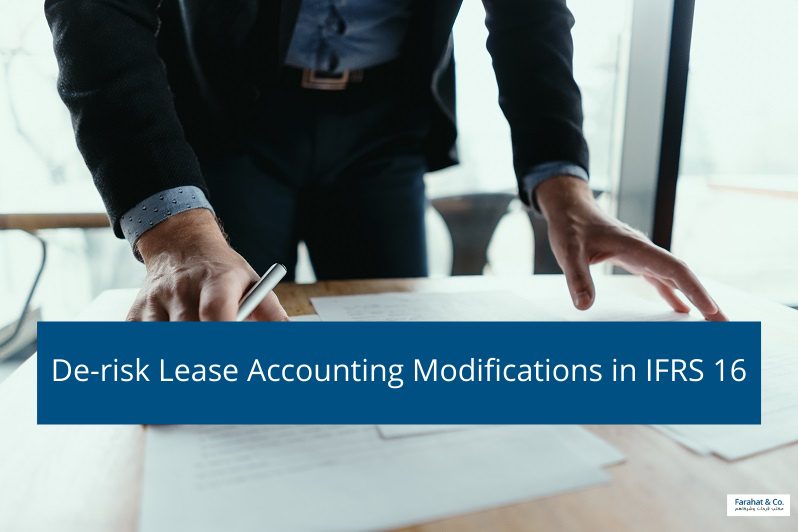Companies and audit firms in Dubai have been hard at work implementing the new leases standard (IFRS 16, with a special focus on transition accounting and Day 1 accounting. While companies may have handled lease modifications during the transition, modifications that occur after transition are an important 'Day 2" aspect of the new standard.
Lessees as well as lessors will need to be aware of these modifications. Accounting for lease modifications is not difficult as they are quite common. This article will discuss the IFRS 16 lease modification guidance and compare it with US GAAP. We also describe the lessee's and lessor's accounting for common types of lease modifications.
What Is A Lease Accounting Amendment?
IFRS 16 defines a "change in the scope or the consideration for a leasing agreement" as a lease modification. This is a result of renegotiations between lessees and lessors. Examples of lease modifications include, but are not limited to:
Addition or removal of the right to use any one or more underlying assets
The contractual lease term can be shortened or extended
Increase or decrease the lease payment.
Audit services in UAE can use multiple modifications simultaneously. A reduction in building space that is subject to a lease and simultaneously an extension of the lease term for the remainder. US GAAP defines lease modifications in a similar way.
Read also: Accounting Entries How to Book Profit Sharing Under IFRS 16
Accounting Lessee of Modifications
A lease modification starts with determining whether it creates separate leases. If both the following conditions are met, a lessee can account for a modification to a lease as a separate lease. The modification expands the lease's scope by granting the right to one or more of the underlying assets.
The lease consideration increases by an amount proportional to the stand-alone cost for the scope increase, adjusted for the specific circumstances of each contract. Modifying the lease term of an existing underlying asset does not satisfy the first condition. It does not give the lessee the right use of one or more additional assets.
Leases On Separate Terms
A modification to a lease creates a separate lease. The lessee does not make any adjustments to the original lease. Instead, the leaseholder accounts for the new lease exactly as the old lease.
A Separate Lease Is Not Required
A modification that isn't a separate lease will require the lessee to account for the nature of the modification.
Comparative Analysis to US GAAP
The US GAAP lease modification accounting is the same as IFRS 16. Due to the differences in US GAAP lessee accounting models, there can be differences in accounting for a lease pre- or post-modification. If the lease is classified under US GAAP as an operating lease before or after modification, it can lead to different accounting.
Lessor Modifications
Leasing modifications are subject to lessor accounting. This is dependent on the classification of leases prior to modification.
Modifications To Operating Leases
If the original lease was an operating lease, the lessor will account for the modification in the new lease starting at the effective date. This includes any accrued or prepaid lease payments that relate to the original lease.
Modifications To Finance Leases
If the original lease was a finance lease the lessor must determine if the modification creates another lease by applying the same criteria to lessees.
Leases On Separate Terms
The lessor does not adjust the original lease if the modification to the lease creates a separate lease. Instead, it accounts for the new lease exactly as the original lease.
A Separate Lease Is Not Required
The accounting is based on the classification of the lease if the modification to a lease does not create a separate lease.
Lease Modification Processes And Controls
Lease modifications can have a significant impact on the subsequent accounting. Company audit teams and audit services in Dubai should not assume that lease accounting is done automatically. UAE companies should instead ensure that they have the processes and controls in place to quickly and accurately identify and account lease modifications.
Companies in Dubai, UAE may need to monitor lease counterparts, approve contract modifications internally and any other ways that modifications could be made. This will require people from various functions of the company, including financial audit, legal and procurement.
Choose Farahat & Co in Dubai TO Help You With Your Accounting Needs
All members of the Farahat & Co lease accounting team have local market expertise and are qualified accountants. They can help you with modifications in regard to IFRS 16 and IBR queries. If you have any questions or would like assistance with your accounting or auditing needs, kindly get in touch with internal auditors.
Read also: Accounting for Lease Liability under IFRS16


